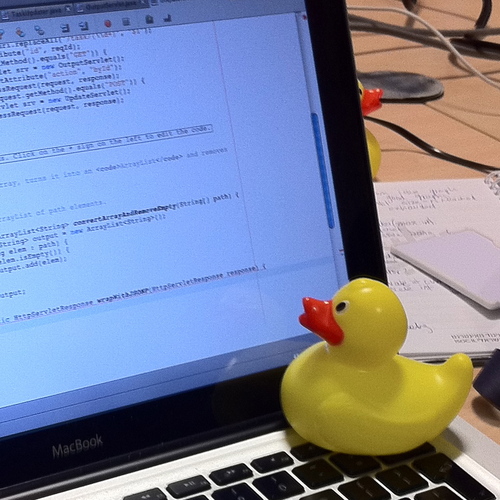Meet Dr. Quackers, Security Consultant
So there I was at 2 AM, staring at a piece of code that was supposed to be a simple user authentication function. Instead, it looked like it had been written by someone who thought SQL injection was just a fancy medical procedure. That's when I turned to my most trusted debugging partner: Dr. Quackers, my rubber duck.

"If you can't explain it to a rubber duck, you don't understand it well enough." - Rubber Duck Debugging Principle (slightly modified for cybersecurity)
If you’re new to the idea, see rubber duck debugging for the background.
The Code That Broke My Brain
Here's what I was looking at:
def authenticate_user(username, password):
# TODO: Make this more secure later
query = f"SELECT * FROM users WHERE username = '{username}' AND password = '{password}'"
result = database.execute(query)
return len(result) > 0
Me: "Hey Dr. Quackers, what do you think about this authentication function?"
Dr. Quackers: silent judgment
Me: "Yeah, I know. It's bad. How bad, you ask? Well, let me explain..."
The Conversation That Changed Everything
Round 1: Basic SQL Injection
Me: "Okay Duck, imagine someone types admin'; -- as their username..."
Dr. Quackers: floats judgmentally
Me: "Right! The query becomes SELECT * FROM users WHERE username = 'admin'; --' AND password = 'whatever'"
Dr. Quackers: continues silent treatment
Me: "The -- comments out the password check entirely! They're in as admin without knowing the password!"
That's when it hit me. I wasn't just explaining to Dr. Quackers. I was finally understanding the vulnerability myself.
Round 2: The Union Attack
Me: "But wait, there's more! What if they use a UNION attack?"
Dr. Quackers: bobs slightly (probably from my desk fan, but I took it as encouragement)
Me: "They could input something like ' UNION SELECT 1,1,1 FROM users -- and..."
I grabbed my whiteboard and started drawing. Dr. Quackers watched as I mapped out how an attacker could:
- Discover the column count with UNION SELECT
- Extract table names from information_schema
- Dump the entire user database
- Probably order pizza with my credit card (okay, that last one wasn't directly related, but I was spiraling)
The Debugging Method That Actually Works
Here's the thing about rubber duck debugging in cybersecurity: it forces you to think like an attacker and a defender simultaneously.
Step 1: Explain the Intended Behavior
Me: "This function should only let valid users in..."
Step 2: Identify the Attack Surface
Me: "But the user input goes directly into the SQL query without sanitization..."
Step 3: Think Like an Attacker
Me: "If I were trying to break this, I'd..."
Step 4: Trace the Exploit
Me: "And then the malicious input would..."
Dr. Quackers' Greatest Hits
Over the months, Dr. Quackers has helped me discover vulnerabilities in:
🦆 SQL Injection (Obviously)
-- The classic
username: admin'; --
-- The union specialist
username: ' UNION SELECT password FROM admin_users --
-- The show-off
username: '; DROP TABLE users; --
🦆 Cross-Site Scripting (XSS)
<!-- Dr. Quackers spotted this in a comment system -->
<script>alert('Dr. Quackers finds your security lacking')</script>
🦆 Path Traversal
# File download feature gone wrong
../../../etc/passwd
# Dr. Quackers quacked disapprovingly
🦆 Command Injection
# Image processing endpoint
filename.jpg; cat /etc/passwd
# Dr. Quackers demanded a code review
The Psychology of Duck Debugging
There's something magical about explaining code to an inanimate object. It forces you to:
- Slow down and think through each step
- Use simple language (you'd be surprised how this helps)
- Question your assumptions (Dr. Quackers is very judgmental)
- Consider edge cases (ducks are naturally paranoid)

Real-World Application: The Customer Portal Incident
Last month, I was reviewing a customer portal when Dr. Quackers and I discovered what I now call "The Query of Doom":
$user_data = mysqli_query($conn, "SELECT * FROM customers WHERE customer_id = " . $_GET['id']);
Me: "Duck, this is taking user input directly from the URL and putting it into a SQL query."
Dr. Quackers: intense staring
Me: "So if someone visits /portal.php?id=1 OR 1=1, they get everyone's data!"
Dr. Quackers: I swear the duck nodded
We found that an attacker could:
- Extract all customer data
- Modify records
- Delete the entire database
- Probably file their taxes (the permissions were that open)
The Fix (With Duck Supervision)
Here's how we fixed the authentication function:
def authenticate_user(username, password):
# Dr. Quackers approved this version
query = "SELECT id FROM users WHERE username = %s AND password_hash = %s"
password_hash = hash_password(password) # Proper hashing
result = database.execute(query, (username, password_hash)) # Parameterized query
return len(result) > 0
Key improvements:
- ✅ Parameterized queries (no more string concatenation)
- ✅ Password hashing (storing plaintext passwords is like wearing a "hack me" sign)
- ✅ Only return minimal data (don't SELECT * unless you need *)

Advanced Duck Debugging Techniques
The Five Whys (Duck Edition)
Why is this code vulnerable? → Because it accepts unsanitized input
Why doesn't it sanitize input? → Because the developer didn't consider malicious input
Why didn't they consider malicious input? → Because they were thinking like a user, not an attacker
Why weren't they thinking like an attacker? → Because security wasn't part of the development process
Why wasn't security part of the process? → This is usually where I start updating company policies
The Assumption Challenge
Dr. Quackers has taught me to question everything:
- "Users will only enter valid data" - Wrong!
- "Our API is internal, so it's safe" - Also wrong!
- "We're too small to be targeted" - Spectacularly wrong!
Pro Tips for Your Own Security Duck
Choosing Your Duck
- Size matters: Big enough to be imposing, small enough to fit on your desk
- Expression: A slightly judgmental look is perfect
- Accessories: I recommend a tiny security badge (for authority)
Setting Up Duck Debugging Sessions
- Start with the happy path - explain what should happen
- Introduce the attacker - what could go wrong?
- Trace the exploit - step by step breakdown
- Design the fix - secure coding practices
- Test with the duck - explain your solution

The Unexpected Benefits
Since adopting duck debugging for security reviews, I've noticed:
🔍 Better Code Reviews
I catch more vulnerabilities because I'm forced to slow down and think through each line.
🎯 Clearer Documentation
If I can explain it to a duck, I can explain it to my team.
🧠 Improved Mental Models
Understanding attacks well enough to explain them makes me a better defender.
😌 Reduced Stress
There's something calming about having a non-judgmental debugging partner (okay, slightly judgmental, but in a helpful way).
Common Duck Debugging Discoveries
Input Validation Failures
Me: "So this function takes a user ID and..."
Duck: stares
Me: "Oh. Right. What if the user ID is negative? Or a string? Or '; DROP TABLE users; --?"
Authentication Bypasses
Me: "The login checks if the password matches..." Duck: judgmental silence Me: "But wait, what if they send an empty password? Or what if the comparison function has a timing vulnerability?"
Privilege Escalation
Me: "Only admins can access this endpoint because..." Duck: continues staring Me: "Because we check a cookie. Oh no. Cookies can be modified. Oh no oh no oh no."
Advanced Security Duck Scenarios
Threat Modeling with Dr. Quackers
I've started bringing Dr. Quackers to threat modeling sessions. The process works like this:
- Describe the system to the duck
- Identify assets worth protecting
- Brainstorm attack vectors (the duck is surprisingly creative)
- Prioritize threats based on impact and likelihood
- Design mitigations that even a duck could understand
Conclusion: Embrace the Quack
Dr. Quackers has made me a better security professional. Not because rubber ducks have magical powers (though I'm starting to wonder), but because the act of explaining complex security concepts in simple terms forces deeper understanding.
The Duck Debugging Security Manifesto
- If you can't explain the vulnerability to a duck, you don't understand it
- Simple explanations reveal complex problems
- Rubber ducks ask the hard questions (through interpretive silence)
- Security is about thinking like both attacker and defender
- Everyone needs a debugging buddy, even if it's made of rubber
So next time you're stuck on a security problem, try explaining it to a rubber duck. You might be surprised by what you discover. And if anyone asks why you're talking to a duck about SQL injection, just tell them it's advanced debugging methodology.
For those wanting to dive deeper into SQL injection fundamentals, W3Schools provides an excellent comprehensive guide to SQL injection that covers the technical details, attack patterns, and prevention techniques that complement the debugging approach discussed here.
Dr. Quackers says: "Stay secure, think simple, and always sanitize your inputs."
P.S. - Dr. Quackers is now demanding a promotion to Chief Security Duck. I'm considering it.
Got your own rubber duck debugging stories? Share them! The cybersecurity community needs more ducks (and fewer vulnerabilities).